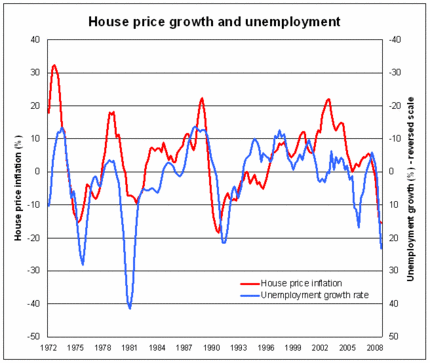Is the worst of the house price crash yet to come?
New Year, new figures from Nationwide showing a new fall in house prices.
No surprise there then.
But the next few months may prove critical to the final shape of our current house price crash.
Will we see a more gentle continuation in the slide in prices or should we brace ourselves for a possible new shocking drop in the value of homes?
Is the recent slowdown, as noted by Nationwide, in the rate of house price falls just the calm before the next storm or is it a sign that the worst is over?
For me the big question is what will be the effect of accelerating unemployment on house prices.
I have to say that from what I can glean from the past it may well be worth preparing for the worst. Here’s why.

It is true that you can only tell so much from the past. It is unlikely to give you the full set of answers, but it can give you a clue or two.
Firstly historic data does help us dismiss the myth that unemployment is generally a trigger to a fall in house prices.
While there is undeniably a link between rising unemployment and falling house prices, it is far from brutally straightforward.
Looking at the housing crashes of the early 1970s, the early 1980s and the early 1990s, you can get very strong correlations between unemployment rising and house prices falling.
But in the early 1970s and early 1990s the rise in unemployment appears to lag by a number of quarters behind the drop in house prices.
Only in the early period of the Thatcher Government is there a hint that rising unemployment may have run slightly ahead of the collapse in house prices.
All the above said, we have to be careful interpreting what unemployed means, because the expectation of unemployment can run well ahead of the recorded unemployment data.
But what we do seem to be able to see when we look at the experience of the past 50 years is that the worst of the house price falls comes as the rate of growth of unemployment increases.
We can also see is that in past recessions house prices did not stabilise until the haemorrhaging of jobs began to ease.
In each of the previous three house price crashes it was more than 18 months (and much longer in the 1990s) after the worst quarter for unemployment growth that house prices began to stabilise.
Now the future doesn’t have to follow historic patterns, but my unsettled stomach seems to be telling me that despite the severe pain already inflicted on those with an interest in stable or growing house prices there is plenty more pain to come.
2 thoughts on “Is the worst of the house price crash yet to come?”
Ouch.
In effect, both are lagging indicators of economic activity. The economy slows down and this leads to a lower demand for housing, which leads to lower house prices. Jobs tend to lag most macro variables as companies intensely dislike having to get rid of people unless they really have to.
Having said that, it would be a surprise if there wasn’t a certain amount of circularity and when unemployment begins to accelerate, you would expect house prices to decelerate quicker.
Noble Francis
Economics Director
Construction Products Assocation
Comments are closed.